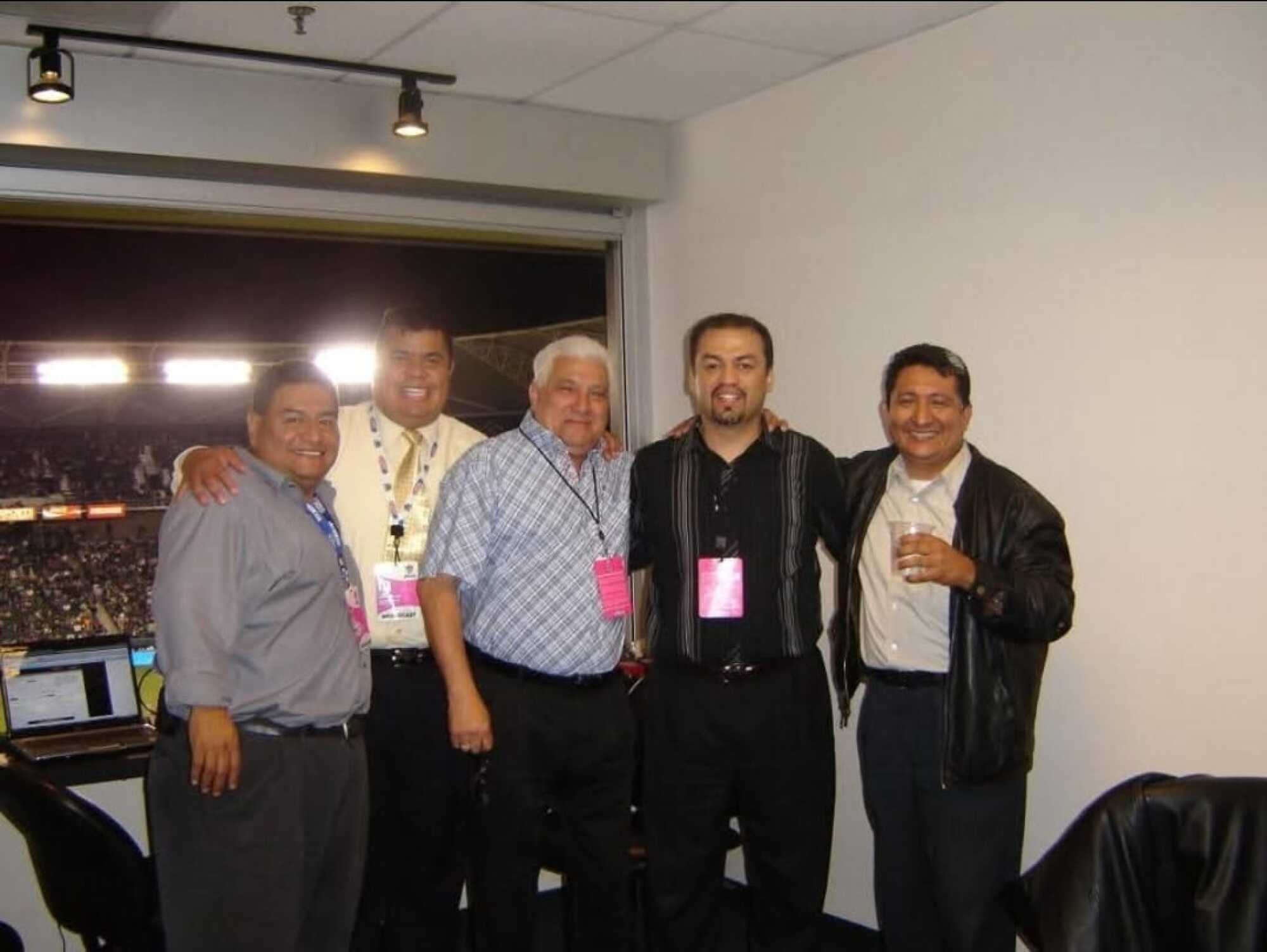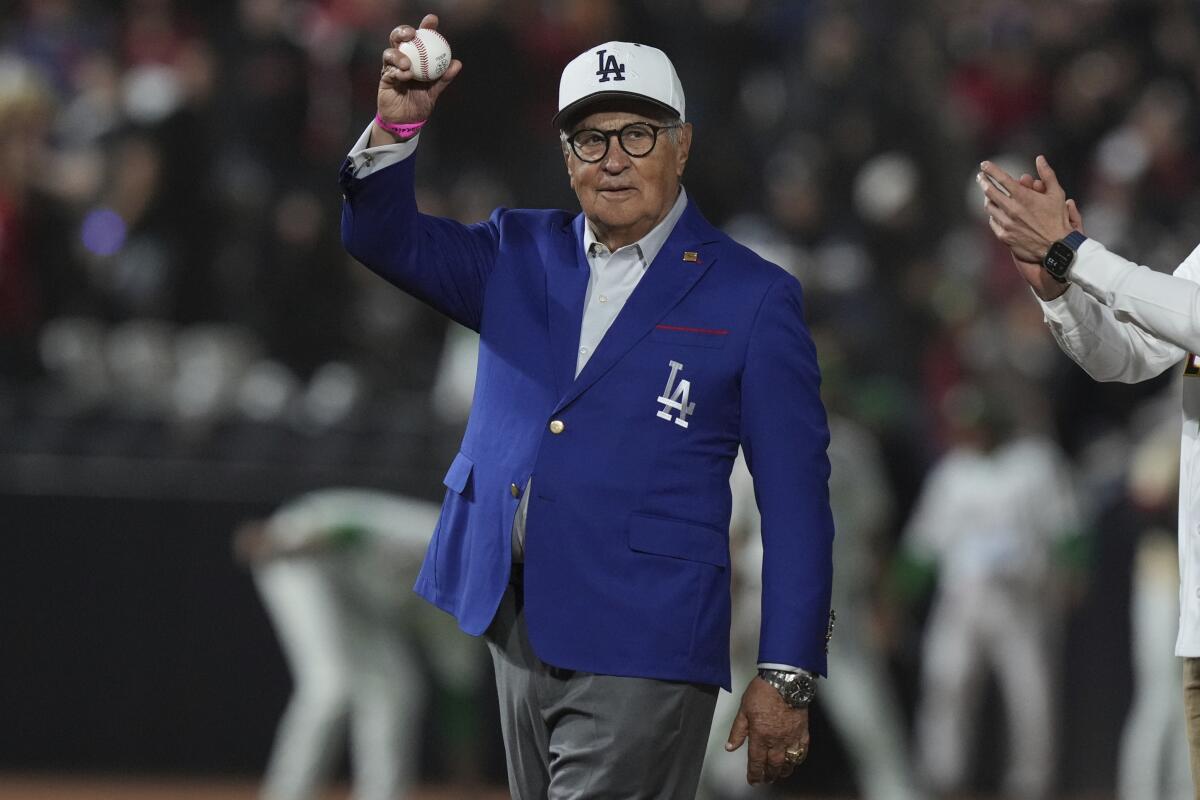Friends bid farewell to Voice of the Galaxy Rolando ‘Veloz’ Gonzalez
The Los Angeles sports world mourned the loss of one of its most beloved voices, Rolando “El Veloz” Gonzalez, the longtime Galaxy broadcaster and a pioneer of Spanish-language sports radio, who died June 25.
His legacy transcends generations on the microphone.
Gonzalez’s career began almost accidentally. Although his dream was to play soccer, life had other plans for him and turned him into a storyteller.
“One day on March 6, 1962, I was playing soccer in the local league and the radio play-by-play broadcaster who was assigned that game of my team Escuintla against Universidad, Dr. Otorrino Ríos Paredes, had a car accident,” Gonzalez recalled in 2017. “The owner of the station ran to tell me, ‘[get dressed, get dressed]’ and I replied, ‘Who are you to tell me to get dressed? Let the trainer tell me.’ He said, ‘I need you because they told me that you narrate soccer.’ I replied that I do that there among the guys.”
He later moved to Los Angeles, where former Dodgers announcer Jaime Jarrín gave him his big break during the 1984 Olympics.
“I met him, I think in 1984, shortly before the Olympics. I needed sportswriters for Spanish-language coverage and I was impressed with his stability, his knowledge, his diction and his voice time for soccer,” Jarrín told L.A. Times en Español. “He worked with me for three weeks, and that opened a lot of doors for him in Los Angeles.”
Jarrín’s call surprised him.
Friends and colleagues join Rolando “El Veloz” González, center, in a broadcast booth during a Galaxy match. He called his last game on May 31.
(Armando Aguayo)
“It was Jaime Jarrín,” González recalled. “He asked me if I narrated soccer and if I had experience in programs. He told me that a narrator for the Olympics was coming from Ecuador and he wanted to have [González ] from 6 p.m. to 12 a.m. on a program. I was leaving the factory at 4:30 p.m. all dirty with paint, and I couldn’t miss that opportunity.”
Jarrín highlights González’s commitment to ESPN Deportes Radio 1330 AM’s coverage of the Galaxy, a team González covered in two long stints in which the team won five of the six MLS Cup titles. The last game González called a game was on May 31, when the Galaxy won their first game of this season against Real Salt Lake at Dignity Health Sports Park.
“He gave his all to the team, as I did to the Dodgers,” Jarrín said. “His legacy is an example for young people. He defined what he wanted to be, and he did it with his heart, with 110% effort.”
Along with Hipolito Gamboa, González marked an era in radio with their “Hablando de Deportes” show on KTNQ-AM (1020) and eventually on KWKW-AM (1330). The show focused mostly on soccer and easily overshadowed other sports programs that tried to copy the format with a more aggressive touch in their conversations.
The González and Gamboa duo presented a more complete analysis without being dependent on fireworks.
“I always had something that made you laugh in the booths of ‘Hablando de Deportes,’” Gamboa said. “It was not all good all the time, because there were moments of tension. That’s a reality, but we always ended well.”
Gamboa described González as someone out of the ordinary.
“He was one of the first to broadcast soccer in the United States. His unique style, his energy, his speed … no one has equaled him,” Gamboa said. “That’s why they called him ‘El Veloz’ [‘The Swift’].”
They worked together broadcasting Gold Cups, Liga MX matches and international matches. Despite his serious voice, Gamboa highlighted González’s cheerful character.
“He narrated with impressive clarity at an amazing speed. People recognized him by his voice,” Gamboa said. “At a party, my little daughter, just 1 year old at the time, heard him speak and said, ‘Goal!’ because we grew up hearing him narrate at the Rose Bowl, at Azteca Stadium, in so many booths.”
Armando Aguayo, who became González’s boss, said he was more than a colleague.
“He was my teacher. What I know about narration, I learned from him,” Aguayo said. “He taught me how to get into the narrator’s rhythm, not to interrupt, to adapt to his speed. He was demanding, but formative.”
Aguayo fondly recalls the two stages he shared with González, first as his producer at “Deportes en Acción 1330” and then as teammates in the second golden era of the Galaxy under Bruce Arena.
Armando Aguayo, who became Rolando González’s boss, said he was more than a colleague: “He taught me how to get into the narrator’s rhythm, not to interrupt, to adapt to his speed. He was demanding, but formative.”
(Armando Aguayo)
“We narrated together the finals, the titles, the big games,” Aguayo said. “And off the air, we talked about family, about the future of radio, about life.”
According to Aguayo, who calls LAFC and Clippers games, González had admirable discipline.
“He would arrive an hour early, prepare, make lists with lineups,” Aguayo said.
During his career González, called World Cups, Olympic Games, Pan American Games, games of his beloved Guatemala national team, as well as the U.S. national team. He covered soccer, baseball, basketball and football.
“The only thing he didn’t narrate was golf, because he said it bored him,” Aguayo said, laughing. “But he even narrated a marbles contest in Guatemala.”
González was known as a great storyteller.
“He would always say, ‘Let me tell you, in such-and-such a year … and he would give you exact dates.’ He was a historian with a storyteller’s voice,” Aguayo said.
Beyond professionalism, Gonzalez left a deep human imprint.
“We called him ‘Don Rolis’ [and] ‘Papa Smurf.’ He was like everybody’s dad. Always with a kind comment, always concerned about others,” Aguayo recalled.
Rolando González, left, joins Armando Aguayo while calling a Galaxy game.
(Armando Aguayo)
González was still active until a few weeks ago. He called the Galaxy’s last game against Real Salt Lake.
“He arrived two hours early, prepared his tecito, sat down to narrate and when he finished, he got up and left, as usual,” Aguayo said. “That was Rolando. Professional, punctual and simple.”
Aguayo spoke with González shortly before hearing the news of his death. Although González recently had a heart attack, he was still answering calls, his voice tired but upbeat.
“He told me, ‘I’m fine. Thank you for your call. It’s very helpful to me. You’re one of the few who called me.’ He told me about the future, about his family,” Aguayo said. “Even in his last days, he was thinking of others.”
For Jarrín, González represented the image of the hard-working immigrant, the passionate communicator, the dedicated professional.
“He never caused problems. He always served the Hispanic community in Southern California with interest. His voice will remain engraved in our memories, and his legacy will live on in every young person who wants to dedicate themselves to sports broadcasting,” Jarrín said.
González’s voice will no longer resonate in the stadiums, but his echo will live on in the memories of his colleagues and in the passion of those who listened to him.
“I was deeply hurt by his passing, because we were great friends,” Jarrín said. “We had a lot of mutual respect, and I liked him very much from the beginning because of his simplicity and his responsibility in everything. So I think that sports fans, and particularly soccer fans, will miss him very much. … He served the Hispanic community in Southern California with a lot of interest, with a lot of enthusiasm. And I will miss him very, very much indeed.”
This article first appeared in Spanish via L.A. Times en Español.

